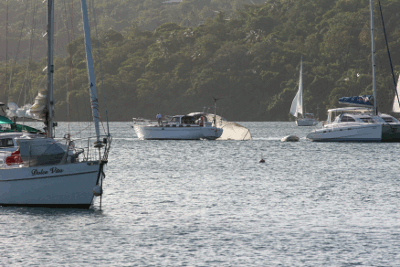-
Friday 5th August 2011
Our plan had been to sail directly from Bora Bora to Palmerston, but there was a low pressure system forming that was starting to move towards our route. It was only given as a 50:50 chance of developing into anything substantial, however we didn't want to risk things so decided to divert to Aitutaki. Aitutaki, one of the islands in the Cook Island group, will always be remembered as the first place we've been to in nearly 18 months where the people speak English as a predominant language.
William Bligh, of the Bounty, sighted Aitutaki in 1789, just 17 days before the infamous mutiny. Bligh later returned to Aitutaki and is said to have introduced the pawpaw which now grows in abundance all over the island.
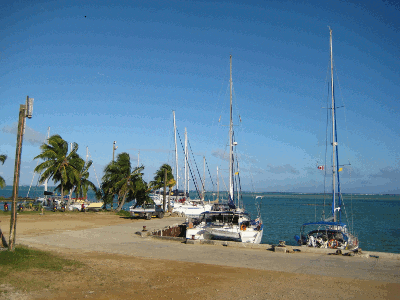
It felt novel to stand in the shop and be able to converse with the check out chick something more than hello, thankyou, goodbye. Mind you, we also had to be careful as we couldn't stand there and comment that the lettuce was looking a little wilted and overpriced because the store lady could also understand us!
Friday night was the Rugby world cup, Australia vs New Zealand, and somebody had organised a large screen TV to be brought down to the Fishermen's Bar. Everybody was invited. We turned up in time for the start of the game and watched the Wallabies get crucified by the All Blacks. Perhaps the slaughter wouldn't have been so bad, except that the whole of the island, or so it seemed, were All Blacks supporters, so there was no quarter shown towards us poor Aussies. Still it was a good night and we revelled in being somewhere where they spoke English.
Saturday 6th August 2011
Saturday came and we decided to see the island. Auitutaki's only small, so we got together with Steve and Dean on “Mamalu” and Evan, Diane and Maia from “Ceilydh” and hired a couple of scooters to explore the island with. The scooters were only NZ$20 per day, so we thought we'd splurge and have some fun. The problem with scooters is that there's nothing to grip between your legs when you're riding, so you always feel a bit insecure and wobbly – or perhaps that's just me. We hired 6 scooters between us and we rode out to the sandy car park adjacent the beach for a photo shoot. Perhaps it was the sunshine, perhaps it was the sand, or perhaps it was just the excitement of having a motor between my legs, but that sandy patch looked perfect for me and my scooter to get acquainted with a few doughnuts. I slid off the seat and planted a foot as I gunned the little 80cc engine and kicked the back out. The scooter did an almost perfect circle in the sand and I was setting up for the second circle when I heard Cheryl yell at me to stop. Spoil Sport! She was just about to give me the lecture on being responsible (just because she can't do doughnuts!) when Dean gunned his little scooter and did a doughnut, almost as good as mine, then pulled up right next to me. What could she say? Was she going to chastise both of us? I think I like Dean!
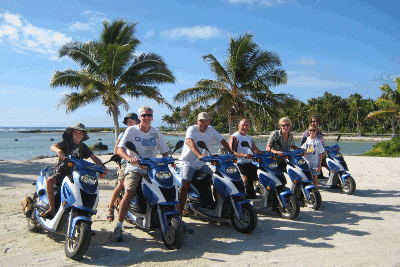
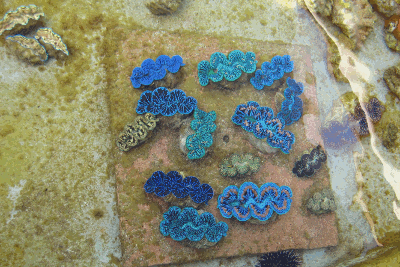
On the journey around the island we stopped at a giant clam breeding centre where they grow these amazing crustaceans before releasing them into the waters around the island. While they're only small here in the photo, they grow to be more than 1.5m in length. We saw some amazing examples of these specimens when we went diving.
We stopped at an old site deep in the jungle that was littered with old obelisk-like stone ruins that date back to around 1000AD. We were told that warriors met here before and after battle; sacred feasts and coming-of-age ceremonies were celebrated and human sacrifices took place here.

After two hours, we'd completed our lap around the island and were left wondering what to do. The island really is very small! We looked on the map and discovered a small road to the top of a mountain that we thought would give us a good view, so the “Wild Hogs on Scooters” set off in procession along the windy roads and up to the top of the mountain. At the top we had a great view of the island and had a first hand perspective of how small Aitutaki really is in comparison to the vastness of the Pacific Ocean. Some days it's hard to believe that we've crossed such a large ocean.
After circulation returned to our lower limbs we climbed back onto our scooters and followed a dirt track from our mountain, down the side and across to an adjacent peak. Half way, we came across some hikers who informed us that we were actually on a walking trail, not a road. Oops! Well we were more than half way, so we decided to continue on up to the other mountain, hoping we wouldn't cross any other walkers. The trail got steeper and steeper until we reached a point where we had to park the scooters and continue on foot. The view from the top of the mountain was incredible. We could see almost the whole island, save for some rain clouds that kept circling and blocking our view. With the afternoon drawing towards dusk, we made our way back down the mountain and back home.
Back at the dock we found a nice flat space and let Chelsea have a turn riding the scooter by herself. She started slowly, making her way across the dock and back again, but it wasn't long before she was riding the scooter like a junior “Wild Hog” and zooming all over the place. I can see she'll be the terror of the black-top once she gets a little older and gets her license … but there's no way she's getting a motorbike!!!
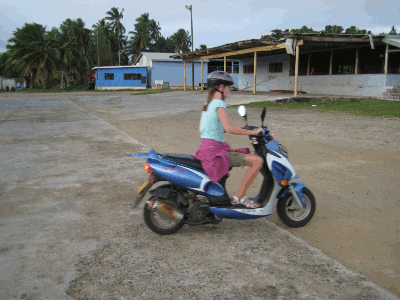
Sunday 7th August 2011
The adults returned the scooters to the hire shop early Sunday morning. On the way back to the hire shop some of us guys took the opportunity to have some fun with our scooters. Truthfully, it was Dean's fault - he started it! I was riding along, enjoying the scenery when this blur on a screaming scooter flew past me. As this body on wheels whizzed past me in a veritable blur of noise and blue smoke, I thought I made out Dean's head as it swivelled to look at me for an instant, an evil grin on his face, then he was gone. I crouched forward on my scooter and gunned the little engine down the straight section of road, watching the tachometer creep slowly towards the red-line. I was racing along the road, the countryside flying past me at speeds that I hadn't experienced in ages. In my world, 8 knots is considered fast! My little wheels were spinning too fast for such a small scooter and I could feel the twitching of the bike as it protested to the speed. All the while I was conscious of the fact that I was only wearing jeans and a T-shirt, no jacket, no helmet, no protection! If I came off at this speed, they'd be picking bits of dirt and road out of me for a month. I saw a van driving down the opposite side of the road, coming towards me. Now here's a side note. They drive on the left hand side of the road here … and it feels wrong. I can't believe that I've been away from home for so long that I've got used to driving from the left side of the car, shifting gears with my right hand and driving down the wrong side of the road! Now I'm finally back in a place that drives on the left hand side of the road and it feels backwards. So here I am blistering along at nearly 104km/h, my little scooter screaming along, trying to catch up to Dean. Just as the van approaches me I realise that my cap is likely to get blown off my head with the turbulence of the passing van, so I did what any sensible person would do. I took my cap off and tried to put it on backwards, so it wouldn't blow away. The only problem was that holding it with one hand, by the peak, as I turned it around to put back on, the bit that normally goes over my head blew down over my face and the little hole at the back of the cap snagged on my nose. This wasn't a good predicament! Riding one handed, barrelling down the road, van coming towards me, temporarily blinded by my cap, no safety gear. Not looking good! I quickly pulled the cap from my face and checked I was still on the right side of the road (aka the left side) just as the van whizzed by me. I stuffed the cap between my knees, put my chin down to the handle bars and continued my assault on Dean. I caught up to him. I overtook him, a grin on my face as I pulled in front of him. Just as I was turning to express my victory, Evan flew past the both of us, the back of his T-shirt flapping up over his head in the air tstream as he barrelled down the road on his little scooter, soundly defeating the both of us.
Having returned the scooters safely to the hire centre, we dressed up in our Sunday best and joined the large crowd of people who were making their way towards a prominent looking church near the dock. The sound of the church bells ringing across the open space and down towards the quay was a beautiful sound. The sun was shining and the sky was blue. It was a fantastic day. At church we listened to some traditional singing and heard a sermon in their local language. Everyone was dressed very formally and the church service was conducted with much reverence and respect. All the ministers looked resplendent, dressed in their white suits, shirts and ties – and thongs on their feet! I guess formality doesn't extend to shoes here in Aitutaki.
The Reverend John Williams of the London Missionary Society, introduced Christianity to Aitutaki in 1839. This was the Cook Island's first introduction to Christianity and this church was the very first church built by John Williams. The church is a beautiful old building made of coral walls, stained glass windows and ornate ceiling decorations. This church is a reminder that Aitutaki was the first of the nation's islands to embrace Christianity. We learnt that there's a monument next to where our yacht is docked, under a tree that signifies where the first church service was conducted.
As we listened to the service, we could gaze out the window and see our beloved “Connect4” bobbing in the blue water down at the dock. Our Australian flag flying proudly. It's amazing the number of places we've visited with “Connect4”.
You know, some days it feels like we've hardly been anywhere or done anything in the last year and a half, but then at other times it feels that we're a world away and it's hard to remember home. Sometimes sailing isn't fun, sometimes it's hard work, sometimes it's even scary. But sometimes we meet strangers who turn into friends and we glimpse an insight into what their life is like. We get to see someone elses world and experience what we've always dreamed of doing – seeing how other people live.
Tuesday 9th August 2011
After a 2 night, 1 day sail from Aitutaki we arrived in Palmerston, a place I've dreamed of visiting since before we bought “Connect4”. Palmerston is a beautiful small island on an atoll in the middle of the Pacific Ocean. The beautiful white sandy beaches fringe a lush green island filled with palm trees that sway gently in the wind. The reef surrounding Palmerston makes the water turn vibrant shades of turquoise. At times when you look into the water, it's so clear that you can see the fish and the coral reefs as clearly as you would a tree in a park. It's simply breathtaking.
We arrived just after 10am and were directed to a mooring ball just outside the pass. A few minutes later, Simon Marsters came by in his boat with an collection of officials. We met Stella, the island nurse, John Marsters, the island's customs officer and Goodly Marsters who collected our $5 per person, island fee. As we completed our check in procedure, Goodly told us that there was a birthday party ashore for Joy Marsters who just turned 1, and we were all invited. Simon, told us they would go and check in the other boats, then would be back in 10 minutes to pick us up and take us to the party.
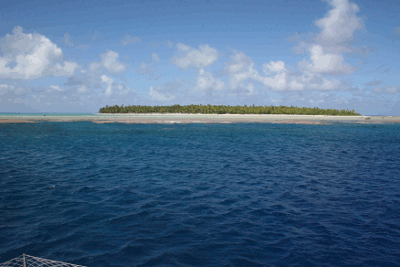
10 minutes! We needed showers, we needed clean clothes fit for an important party, we needed a present and we needed more time! We flew through the shower, searched “Connect4” for clean clothes without holes in them and we scoured for a present for a one year old. Breathless, we were ready to go, just as Simon pulled up to collect us barely 10 minutes later. We had a packet of coloured pencils and a nice new brightly coloured inflatable ball as a gift for little Joy, which I'd just pumped up moments before and we all looked presentable … we hoped.
Ashore, we met our hosts Ps Tere and Yvonne Marsters and their daughter Shekinah. As we learnt, when you stay on Palmerston Island, you aren't just welcomed as guests, you're adopted by a family who look after you in every way possible and who extend the rights of their family to you. In essence, you become a member of the host family for the time of your stay and you're entitled to everything the host family is entitled to. It's an amazing feeling to be adopted by strangers and taken in as family. Tere is the islands Secretary and is very busy running and overseeing the operations of the island. Yvonne is the school principle and is also equally busy running the school and tending to the needs of the students. Both people work very hard, so it was doubly special that they still took the time out to host us.
While I was talking with Tere, I heard that they had some solar panels that they had wanted to fit, but didn't have anyone who could fit or wire them, so I offered to help. Tere gladly accepted my offer and we agreed to make a start tomorrow morning.
We were given a guided tour of the island and were shown the original hut that William Marsters built, as well as his grave. We were told some of the history of the island and were fascinated by the little village and the friendliness of the people.
William Marsters was an Englishman, born in Walcote, Leicestershire, who took to the seas when he was a young lad. He jumped ship in Polynesia and ended up marrying the chief's daughter and for good measure, married her cousin as well. William and his two wives moved to Palmerston Atoll on July 8th 1863 to work the plantation, however soon after moving there the owner died, so he was left running the plantation. Time went by and the supply ship that used to visit stopped coming for a number of years and his connection with the outside world diminished. Some of the plantation workers left, and one worker left without his wife. William later took this lady as his third wife and set up three distinct “families” on the island. The windward family, the middle family and the leeward family. Each family (wife) had an area of land allotted them and William took great care to plan for the future by putting regulations in place regarding who could marry who and the like.
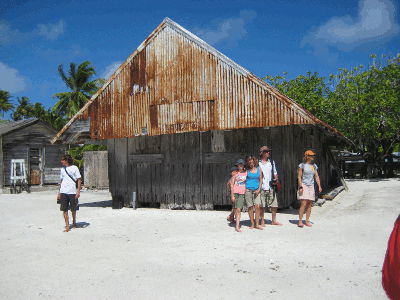
William died on Palmerston Atoll in 1899, but his descendants still live here, still divided into three families and all still with the surname Marsters.
It's an amazing feeling to stand outside the house that William built when he came to the island. It's even more amazing to be surrounded by people on an island who are all descendants from the same man and to be able to trace family history back so clearly, all contained in one small island.
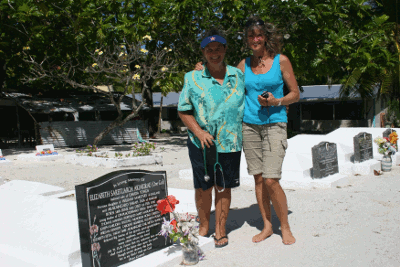
Before we came to Palmerston, Suwarrow island was on our short list of places we wanted to visit. Sadly, we couldn't visit Suwarrow and Palmerston as Suwarrow is quite a way to the north, whereas Palmerston is quite south. I was intrigued to visit Suwarrow island because of the stories I'd heard about Tom Neile, a man who lived alone on Suwarrow for 16 years between 1952 and 1977, and who wrote an account of his time spent on the island in his book titled “An Island to Oneself”. On Palmerston, I met the island's nurse, Stella, who is Tom Neile's daughter. She told us about her connection with Palmerston and is pictured here next to her great grandmother's grave, Akakaingaro Sara Tata, wife of William Marsters. Just before we left the island, Stella gave Chelsea a signed copy of her father's book “An Island to Oneself” as a birthday gift.
The party was spectacular and it looked like all 63 of the island's residents had turned up. The food was a feast of local treats and during the luncheon I had the privilege of meeting some of the older grandmothers of the island as well as the birthday girl. We were going to offer our present to Joy, but when I took the ball out of of our back pack, I was horrified to see that it had turned into an egg! There was no way we could give her a ball that looked like and egg! Sadly, we hid it back into the back pack.
Nick made friends with Edward Marsters, the island's only policeman, and was always excited to see him. Perhaps it was because he rode a quad bike?
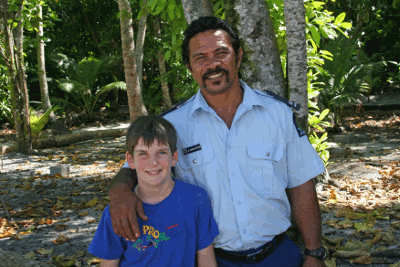
Wednesday 10th August 2011
What a great day we had today. We were picked up at 10am and taken ashore to help with some island projects. I spent the first half of the day working at the council office, first making a wooden frame for a solar panel, then fitting onto the roof, then finally wiring it to the regulator and the battery bank. After we finished the council's solar panel we went to Tere's house to fit and wire his solar panel. I later heard Tere had been waiting almost four years to get the solar panel fitted and working, but never had anybody who could do the job. To be totally honest, it was great having the opportunity to help. I love my work and to be able to assist the island with my skills was so satisfying. I worked all day with gusto and as we were being taken back to “Connect4” by Simon, I reflected on the days events and couldn't restrain a smile of satisfaction. It's been a special day, it's been a great day. Life is good.
Thursday 11th August 2011
Today was another busy, but satisfying day. We were picked up by Simon around 8:00am and taken ashore. The whole island is bustling with excitement as there's a dentist on one of the other yachts here in Palmerston and he's offered to help by checking and performing dental work on everyone that needs it.
Today I finished fitting and testing the new solar panel that we installed in Tere and Yvonne's house. When that was done I started installation of a new HF radio base station that Tere purchased a couple of years ago, but once again, couldn't get fitted.
I'd been speaking with Yvonne last night about the school and the children's learning and in conversation she mentioned that some of the students were struggling with the concept of algebra. One girl in particular had completed her work book a number of times, but each time she'd taken the examination, she'd just missed out on a pass. I offered to help run a couple of maths classes for the students, so here I am, in front of a maths class at the “Palmerston Lucky School”, going over principles of algebra and helping the students with their questions.
There are three girls studying senior algebra at the school, but unfortunately they don't have a maths teacher who can concentrate on teaching them the senior maths, so they study more in a home schooling type environment, learning at their pace. To have someone who could stand at the white board and teach them; look at their work and answer their specific questions was a huge treat for them. For me, I loved every minute of it. It was an awesome privilege to be able to share my learning with them and to see the smiles on their faces as they solved problems they couldn't previously solve.
Getting back to “Connect4” took a little longer than we'd hoped. The dentist who had worked all day, was still working into the night, trying to get through his long list of patients. As a result the boat taking us back to our yacht was delayed so they could make one trip with all the yachties. We ended up having dinner with our hosts, but then had to wait until around 11pm for a ride back. We all fell into bed, exhausted but happy with the day. It's a great life we have.
Friday 12th August 2011
Once again we were up early and we went ashore for another day on this island paradise.
The dentist was fully booked for a full day of fillings and repair work and I had a list of electrical jobs to be done. Today I was wearing my electrician's hat – I was fitting a new circuit breaker and installing some power points. First up though I finished installing the HF radio at Tere and Yvonne's house, then went to the school to teach another lesson on algebra.
The algebra class was assembled and we commenced with the lesson. Unfortunately, Goldeen, one of the students, had to leave the class early and go to the dentist. She'd been called out of the class yesterday for the dentist and was disappointed that she'd miss today's class, but was hopeful that she'd be back before the end of class.
The class finished after a good session. We went through many different problems and once again it was so special to see the student's smiles and comments as the algebra clicked with them and they understood it.
After class I wandered over to see the island nurse and the dentist. As I arrived I spotted Goldeen, the student who'd missed out on the two algebra classes. When she spotted me, she looked very upset as she realised that she'd missed out on the second class; my heart went out for her, so I offered that I'd make the class up to her if she'd like to find a time that suited her. I'd never realised just how much my little classes meant to the students until then. What a privilege it is to be able to be able to give something to these students. Yvonne told me that when these three girls complete their studies, they'll be the first students in the history of Palmerston Island ever to complete their schooling to university entrance level.
Sunday 14th August 2011
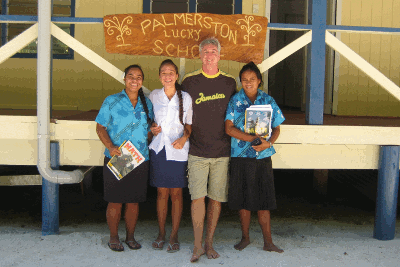
[Left to right in the picture are Marian, Shekinah and Goldeen.]
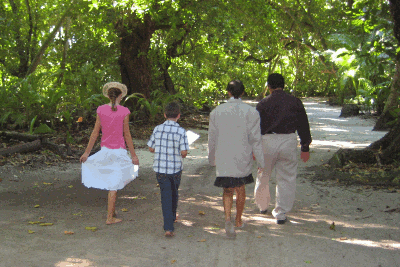
We weren't planning on staying in Palmerston this long, but it's hard to tear yourself away from a place that's so friendly and where you can help so much. We were invited to Palmerston's church and we were picked up early by Edward and brought ashore. We made our way to Tere and Yvonne's house where Chelsea was decked out in a borrowed skirt and hat from Shekinah and Cheryl was loaned a hat from Yvonne. Church in Palmerston is a pretty formal affair and we wanted to make sure we fitted in and didn't offend anyone. We were all set to depart for church, the girls all looking glorious in their woven hats, when we realised that Chelsea was barefoot! Much to Chelsea's disgust, we made her wear a pair of Cheryl's old thongs, the only spare footwear available at the house, as we tried to explain that we needed to get dressed up properly for church. We arrived at church just as the bell was being rung to announce to the people of the island that church was starting. The bell was a beautiful old brass ship's bell with the name “Thistle” engraved onto it. The history of the bell was that it belonged to a ship called the “Thistle” that was wrecked on the reef in a storm. The islanders stripped the boat of all its timber and built their first church from the remains of the boat. The church stood for many years, but recently had to be replaced because it was starting to fall down. The new church was built, and the bell takes pride of place at the entrance to the church.
The church service was beautifully simple with half the hymns in english and the remaining in a Maori dialect. It was later explained that normally they sing most of their hymns in Maori, but for our benefit they selected some English hymns.
After church we went back to Yvonne and Tere's house and enjoyed yet another fantastic meal. Since we've been on the island, we've only ever eaten breakfast aboard “Connect4”. All our lunches and dinner's have been provided for us – the hospitality here is incredibly generous. Every meal we've eaten has been amazing: different fish dishes, breadfruit dishes, coconut dishes and other island delicacies we feel like we're in heaven. Best of all there's always an esky full of freshly chilled coconuts – you just lop the top off with a machete and there you have it; a fresh, healthy, chilled coconut milk drink to wash down the meal.
In the afternoon, Goldeen came over to spend some time with me, catching up on the two algebra lessons she'd missed. We worked hard for almost two hours and I was impressed with her enthusiasm and determination, as we covered a lot of ground in that time. I was also excited to learn that her family hosted “Northern Magic” when they visited the island almost 15 years ago as they sailed around the world. The chronicles of “Northern Magic” were one of the main books that inspired us to believe that we could undertake this adventure. To read about this young girl that Herbert and his family fell in love with during their stay on the island, then to have the opportunity to help teach her, felt like we were somehow closing the circle on events. We were somehow aligning ourselves with the very cruisers that helped us believe that we could indeed do this.
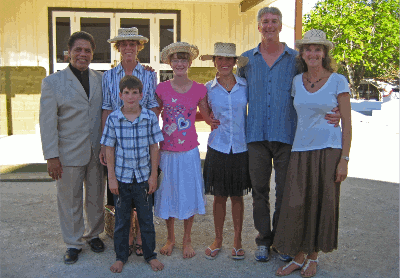
We'd been invited to spend the night ashore in Tere and Yvonne's “Thatch House” that doubles as a guest house now they have their new timber house built. Prior to building their current house, the thatch house was their home for approximately 6 years while they started off on the island. As the wind was predicted to be calm, and “Connect4” was on a mooring ball, we took the opportunity to sleep ashore – the first time we'd done so since Morocco, almost a year ago.
Monday 15th August 2011
The morning dawned bright and early. Through the open window we could see the azure waves breaking on the yellow sandy shore and see the sun starting to rise above the vast blue Pacific Ocean, but we felt decidedly old. You see, we woke to discover that we're now the parents of a teenager – Chelsea turned 13! Somehow in the night we suddenly aged – how can we have a teenager already? Surely there's some mistake – perhaps our little baby will come back? It can't be 13 years already? Can time really go that quickly?
For her birthday, Chelsea got a beautiful Tahitian black pearl on a silver necklace and a game of Blockus, something she's been wanting ever since she played the game on another boat earlier in the year.
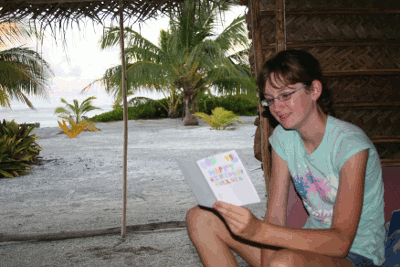
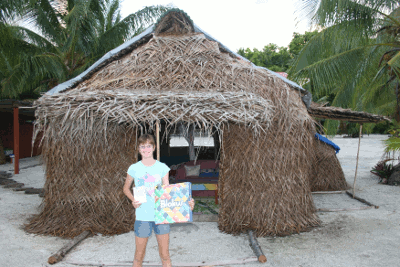
I'd been invited by Tere to lead the weekly devotion with the administration personnel at the office. At the beginning of the week they always start with a group devotion, so I was privileged to be invited. After the devotion I raced back to the school to teach my final algebra lesson with the students.
Shekinah came home from school early and started preparing an “Oumoo”, or underground oven, as a birthday lunch for Chelsea and our family. The underground oven is a treat and is prepared by digging a pit, then making a large fire inside the pit. Once the fire is burning well, large rocks are placed on top of the fire which heat up as the fire burns down. When the fire has burnt down, the food, wrapped in wet palm leaves is added and the whole oven is sealed and covered to allow the food to cook slowly. While this “Oumoo” was a little more modern in that it was bricked in, so didn't require digging a pit, it didn't lose anything in the taste.
Cheryl had been busy all morning finishing a birthday cake and various other treats for the birthday party. At 3:00pm, the underground oven was opened and the aroma of the lunch was mouth watering. We were joined by some of Chelsea's new friends and we all ate a feast fit for a 13th birthday. One of the best things we ate was a succulent barracuda that Tere, Nick and myself caught when we went out trawling Saturday afternoon as a reward for all the work we'd put in through the week.
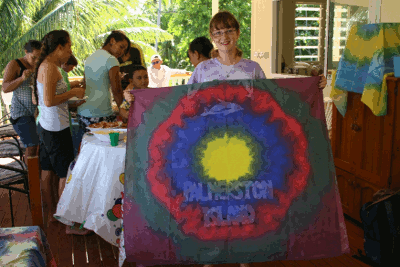
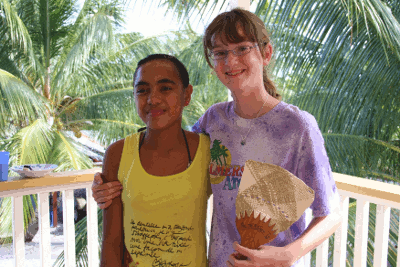
After the party was finished and as the sun started to set, we made our way back to “Connect4” and bade our final farewells to Tere, Yvonne and Shekinah, knowing that we may never see them again. This is the other side of cruising; you meet so many fantastic people in your journeys, friends that show you kindness and become a part of your world for a brief time, but then you have to say farewell and move on, knowing you may never see them again. After Tere, Yvonne and Shekinah left we shed some tears, nobody wanted to leave, but we knew it was impossible to stay. We'd already stayed much longer in Palmerston than we'd ever intended and were seriously behind in our schedule if we were to make it to Fiji before our friends arrive.
Tuesday 16th August 2011
My sleep was shattered by the VHF radio as a frantic call came through sometime around 3am “... any cruisers, anybody on Palmerston Island, ANYBODY, this is the yacht “Ri Ri” … my mooring has broken and my yacht has been pushed up onto the reef … I need urgent assistance right now!” The panic in his voice had me instantly awake and leaping out of bed as I grabbed the radio, frantically trying to pull my clothes on and wipe the sleep from my eyes. As I listened to the frantic calls from Frank onboard “Ri Ri”, I could hear the sickening sound of his boat being picked up with each wave and smashed violently onto the reef again and again. We both knew that no boat could withstand that punishment for too long. Within minutes I'd collected a couple of long ropes from my forward locker, a torch, my hand held VHF radio and my life jacket and was being picked up my Michele, another cruiser on a catamaran next to me who had also responded to the radio call. We raced towards “Ri Ri's” anchor light that we could see down the coast a little way but once we got there we realised to our dismay that he was hard on the reef and was in the middle of the breaking waves. We tried making a close approach to “Ri Ri” to see if we could possibly attach a line to her, but it became immediately clear that to get close was too dangerous, the breaking waves would almost certainly tumble the dinghy and smash us onto the exposed coral reef. As we moved back behind the rows of breaking waves we were joined by Simon and Edward, from the island, in their two boats. They believed we could get to “Ri Ri” from inside the lagoon, so we quickly transferred our ropes and equipment into their boats and after dropping Michele's dinghy back, raced through the channel and into the lagoon. The trip in was scary! One of the locals was on the bow of the aluminium boat silently directing the driver between the dangerous coral rocks and reefs with subtle hand signals as we raced at way too fast a speed through the narrow pass in almost pitch darkness and flew across the coral studded lagoon towards shore.
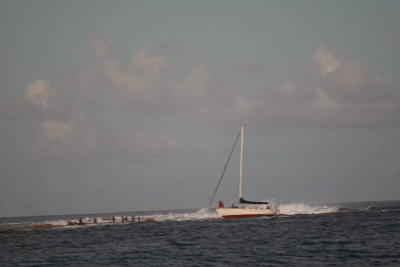
On shore, we transferred our ropes to an awaiting quad bike and trailer and took off around the northern side of the island. Once there we started wading out through the lagoon towards the outer reef and “Ri Ri”. An update from Frank told us that he was now taking on water faster than his bilge pumps could pump it out and he was trying to collect his most important possessions. He was worried that she might break up, but he wasn't sure how he could get off the boat. I advised him that we were getting closer and would soon be there to help. The wade through the lagoon with the heavy ropes was tiring, but the last 50 meters were the hardest and most dangerous as the large white foaming waves that were breaking on the reef lay between us and the stricken “Ri Ri”. We were close enough now to see that every large wave that crashed over the reef mercilessly picked up “Ri Ri” only to drop her back onto the sharp reef without quarter. Every time she was pounded back onto the reef we could hear the sound of the fibreglass hull being ground onto the sharp reef. I felt sick in my stomach – the sight, the sounds, I knew I'd never forget this night as long as I lived!
We walked as far out into the surf as we could, bracing ourselves sideways to stop from being knocked over as the waves came in. The waves seemed to be coming in sets of three, and as the waves withdrew the water was only about knee deep, so we waited for a set to complete, then ran for the boat as fast as we could over the slippery rock and coral, hurling ourselves onto the lifelines of “Ri Ri” and pulling ourselves clear of the water just as the next set of waves came over the reef and hit us.
Holding tight to the outside of the lifelines, “Ri Ri” was once again picked up about half a meter and dropped without remorse onto the rocks, causing the whole boat to shudder and groan in agony. It took all our strength to hold on, had we slipped, we might have got crushed under the hull as it came down on rocks. On deck, some of the locals started trying to run out anchors to secure her, so I made my way down below to find Frank. Inside, the scene was even more distressing. Personal belongings and equipment were strewn all over the place, knocked from their homes when the yacht struck the reef. The floor was ankle deep in water even though I could hear the bilge pumps working frantically. Frank, traumatised as he was, was working hard to decide which of his belongings from the last 10 years of life aboard were most important to him that he should try to take them off first. As I looked around the cabin taking in the scene of destruction and deciding what to do first, a larger wave hit us and we were thrown across the cabin. The boat was listing now and with all the floor boards floating in the water, moving about the cabin was becoming more difficult and dangerous. On more than one occasion I slipped on a floating floor panel and fell knee deep into the bilge, cutting my legs as I fell against the aluminium framework. Every 30 seconds or so, another merciless wave would strike the yacht and we'd get thrown about inside her, there no reprieve.
We worked until the sun started to come up. We'd worked through the falling tide, but now the tide had started to turn and was rising again, making it more and more dangerous to be onboard. “Ri Ri” was starting to break apart. As the sun lightened the water outside, I could make out the outline of two holes in the hull where the sunlight was filtering through. The timber framework of the bench seat on the starboard side was cracked and so was the bookshelf behind it – a clear sign that the hull was starting to fail. Still we worked to get as many of his possessions off the boat as we could. Frank told me when the wind picked up earlier in the night, he started to worry so decided to stay awake and watch his boat. He stayed awake for a couple of hours, but guessed he must have fallen asleep at some stage because the next thing he remembers is being woken by the sound of his yacht striking the reef. While I worked, I cried for him, this was his home, this was his life, his memories, his dream in retirement. Ten years worth of sailing. He told me his dream was to sail until he couldn't sail “Ri Ri” anymore, then he'd find a nice marina somewhere and spend the rest of his days with her. With a tremble in his voice, he said “I guess this is the end, I won't be sailing her anymore will I?” My heart broke and I cried again for his loss – how easily it could have been us.
We had to leave the boat for the peak of the high tide as it was just too dangerous to be on the boat as the waves were threatening to tumble the boat. We
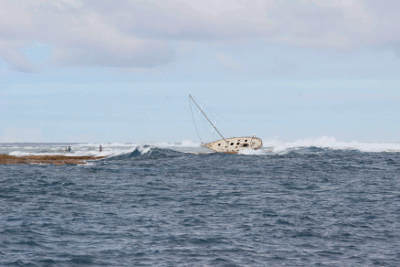
We worked for 15 hours straight. From 3am when we first got the call until 6pm when the sun was setting. I think I stopped once in the day to have a drink of water from a bottle I found floating inside the fridge and to eat a couple of sun dried tomatoes that I found in a jar somewhere in the bilges. Aside from that, I didn't stop. Sunburnt, dehydrated, cut and exhausted both psychologically and physically I was taken to the clinic to get some of my cuts and grazes assessed then cleaned and dressed by Stella, the island's nurse. After I was given the all clear, I was taken back to Tere's house for a quick meal then back to “Connect4” to sleep.
As much as I craved sleep, I couldn't find it. Each time I shut my eyes I was back inside “Ri-Ri”, being lifted and dropped onto the reef. The sound of fibreglass being rent on rock pervaded every part of my body. I'd open my eyes just to remind myself I was out and not in danger anymore. Every cruiser was nervous about the moorings that night. Our anchor alarm that we set each night was turned on with a tighter than normal radius to make sure we'd get as much warning as possible if our mooring also broke.
I guess I must have drifted into a sleep at some stage, because I was woken by the sound of my anchor alarm screaming. My limbs ached and every part of me hurt as I used all my remaining strength to pull myself out of bed and to get up on deck. I was in the saloon before I'd managed to get my eyes open. My head was spinning. I silenced the anchor alarm and went out on deck to check the mooring. With relief, I realised that we hadn't dragged or broken the mooring, but rather we'd just turned around on the mooring ball as the wind changed direction. I reset the alarm and went back to bed, only to have to fight through the dreams once again. My anchor alarm went off at least another three times in that long night. I wanted to set the alarm with a more generous radius, but I couldn't bring myself to do that, knowing I was only 50 meters off the reef.
Wednesday 17th August 2011
With heavy hearts we left Palmerston around lunchtime today and set our bows in the general direction of the Kingdom of Tonga. We loved our time in Palmerston, we loved the people and we loved the experiences of island life. However as we sailed away from Palmerston, we saw the remains of poor “Ri-Ri” on the reef, slowly being destroyed by the breaking waves and knew we'd always remember Palmerston for the tragedy as well as for the adulation.
Saturday 20th August 2011
This trip sucks! We had nice winds for the first 24 hours, but then the weather turned sour on us. We've been riding out short sharp 4 meter seas that are on our beam and slam into the side of poor “Connect4”, constantly trying to slide us sideways or spin us around. The winds have been up and down with the squalls and are regularly gusting up to 38 knots. This is the first time we've ever had seas breaking into our cockpit! Everything inside the cockpit is soaking wet with sea water. The nights are the worst as there's no moon until after 3am and I can't see the waves coming, When I feel a wave pick us up I quickly duck down between the helm and the saloon to try to stay out of the worst if the water comes into the cockpit. Being hit by a wave breaking into the cockpit is like being hit by a pressure hose – it hurts and there's lots of it. In the middle of the night, it just makes you wet, cold and miserable. Oh, and I'm feeling sea sick too!
Now as if this isn't bad enough by itself, we also blew out our mainsail between the second and third reef. Fortunately, if there is such a thing when you apply it to your mainsail ripping, it let go along the stitching, so I'm guessing that it's probably a result of UV worn thread as it was only blowing about 25 knots at the time it let go.
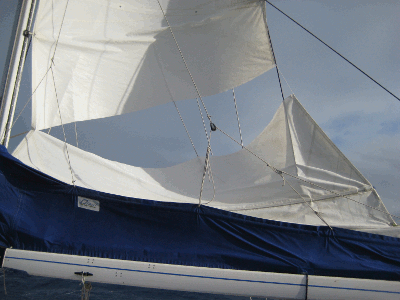
Sunday 21st August 2011
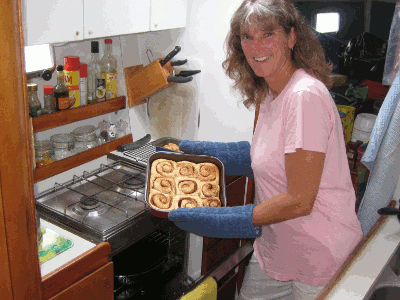
After blowing out the mainsail yesterday, we're running under a triple reefed main, so our progress has slowed even more.
On the plus side through, the wind and waves have given us a short reprieve and Cheryl set to trying her hand at making some cinnamon scrolls that Yvonne told her about. They turned out scrumptious and brightened out day hugely, although just between you and I Maggie (aka Mehari) I think your scrolls are still the best.
Today we also caught a fish. YAY! A nice sized Tuna at that. Before I left, Tere gave me a nice heavy fishing line with a tyre tube bungee attached at one end. This is secured to the boat and the line is let out behind the boat. The idea is that when the fish is hooked, it tires itself out on the bungee, then you just pull it in. I must confess that this works a treat and we landed a nice fat Skipjack Tuna that made great eating for a good few days.
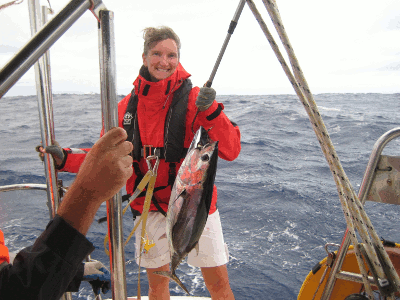
Thursday 25th August 2011
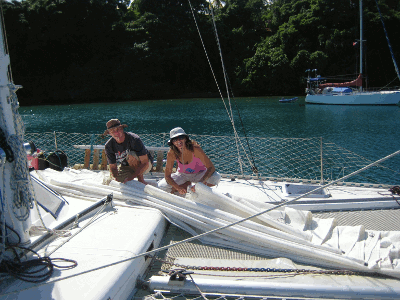
We spent the morning unhanking the mainsail and taking it down so we could deliver it to the sail maker for repair. I was fortunate to find a good sailmaker in a sail loft just near the Sunsail charter group. He's offered that the sail can be repaired easily and cheaply which is great news. He's even agreed to put another row of stitches along the other seams to reinforce them and will check the sail over for any other damage. With a bit of luck we'll have the ail back in a day or two.
Have you ever seen a yacht get de-masted? It's not a nice sight. We were sitting on the deck of “Connect4” this afternoon watching the start of a casual afternoon “Beer Race” that cruising yachts are invited to compete in here in the bay. Basically it's a coupe of laps up and down the bay. “Reckless” was making her way out from the anchorage, past a couple of boats when I heard a loud crack and saw the mast and all the rigging start to fall away from the yacht. The rigging went into the water and the boat spun around on the spot, weighed down by the weight of the mast and sails that were now in the water.
Fortunately for the skipper, he was close in and managed to drop his anchor fairly quickly. There were dinghies there to assist him within minutes and he was able to secure his rigging and mast without losing anything.
The guy was really lucky. If his rig was to fail anywhere, he couldn't have picked a better place. I mean, if it had happened between Palmerson and Tonga in the seas we experienced, he'd have had no choice but to cut the rigging free and lose everything. He may even have had to abandon the boat. Luckily for him, it failed in a quiet, shallow bay and he could limp back to his mooring ball, barely 100m away. Fortunately there's also rigging services here to help put the mast back up. Not something that could be done in many of the other islands.
